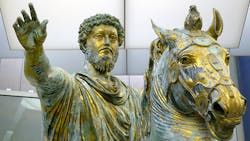When I wrote a column last summer that our economy, and our world in general had reached the maximum value we might reasonably expect from “experts”, I intended that would fulfill my undefined obligation to have an opinion on presidential politics. When these moments arrive every four years I promise myself to avoid the subject as much as possible: first, because the likelihood for embarrassment is high; and second because the things that seem important at the time I’m writing aren’t likely to matter much once my draft appears before your eyes. In the search for leadership, I maintain, we don’t really need experience or commitment to some cause of the moment: we need individuals of good character, and in search of that almost no one can be found to be acceptable. The lack of good character is a reflection of who we are, but also of how we evaluate others.
I understand that forgers and all manufacturers have a vested interest in the procedure of politics, but they usually treat it like a lottery to be won. FIA schedules two days every spring for its members’ executives to conduct some Washington lobbying — and many other industrial associations do the same. And this is not new: I remember a photograph in the office of an executive I interviewed some time ago, showing his grandfather (and predecessor at the firm) together with some professional colleagues at their meeting with President Coolidge.
I note too that almost every meeting and conference this year will present some ‘timely’ political analysis or commentary, which is strange because the summary of every analysis of recent months has been that no one could anticipate the improbable developments so far, no one has seen anything like it before, and no one knows what to expect next month, nor next fall, nor next year. No one knows, but all that analysis is a good way to fill up time.
Filling up time is remarkably important to people of our era: with the power and authority granted by our handheld devices, we want answers (and everything else) quickly.
When I wrote last summer it was with a deepening frustration that the population had become entranced with spectacles and celebrities: spectacles give the sensation that we are involved in consequential activities, and celebrities satisfy individuals’ desire for some personal engagement, some sense of empathy. Were he with us still, I suspect Coolidge would have a hard time getting those manufacturing executives’ attention.
Seemingly, the man whose most famous quote is “the chief business of the American people is business” should have much to engage a population fixated with time, demanding of attention, and eager for reward, but the problem is more fundamental than just knowing how to give people what they want. It is to make people understand why they are here – meaning, why they are alive — and what is expected of them.
As it was approaching its decline and collapse the Roman Empire produced a great leader in Marcus Aurelius, who rose to power because of his success and courage in conflict, and his judgment and patience among colleagues and rivals. Once seated as emperor, he knew well the defects and weaknesses of the realm he controlled, and yet he persevered, and succeeded even further, with the perspective to know how little his own influence would matter on the last day. Marcus remains celebrated because his private writing, his Meditations answer truthfully, and without spectacle, the difficult daily questions about life and its purposes.
Though unlikely to emerge in any political debate or discussion, or in entertainment or business, or in any other diversion we may derive to fill our time, these questions have answers if we’re willing to accept them.
About the Author
Robert Brooks
Editor/Content Director - Endeavor Business Media
Robert Brooks has been a business-to-business reporter, writer, editor, and columnist for more than 20 years, specializing in the primary metal and basic manufacturing industries. His work has covered a wide range of topics including process technology, resource development, material selection, product design, workforce development, and industrial market strategies, among others.
Currently, he specializes in subjects related to metal component and product design, development, and manufacturing—including castings, forgings, machined parts, and fabrications.
Brooks is a graduate of Kenyon College (B.A. English, Political Science) and Emory University (M.A. English.)

